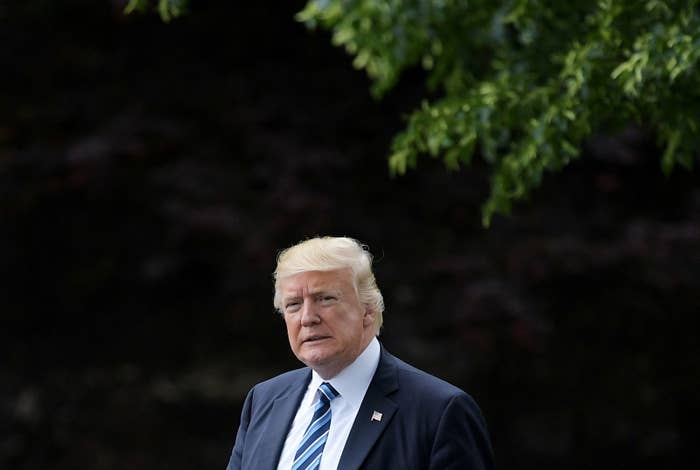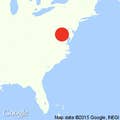
Donald Trump’s presidential campaign comments calling for a ban on Muslim immigration — and statements he and his advisers made about the travel ban after he took office — hung over arguments before a packed courtroom on Monday.
The Trump administration was in court once again — this time in the US Court of Appeals for the 4th Circuit in Richmond — to defend the latest iteration of the president’s efforts to adopt a temporary ban on immigration from several majority-Muslim countries.
A full sitting of the 4th Circuit met to hear the case, skipping the traditional three-judge panel that normally hears cases when they first go on appeal. Democratic appointees hold a solid majority on the 4th Circuit, and they appeared to lean towards the ban’s challengers, pressing Acting Solicitor General Jeffrey Wall about how the court could ignore what Trump and other officials said over the past year and a half. The more conservative judges focused on concerns about judicial interference in the president’s authority to make national security decisions.
“There is this affirmative duty to sort of look if there’s bad faith. And to determine in bad faith, don’t we get to consider what was actually said here, and said very explicitly?” Judge James Wynn Jr. asked Wall. “Even after the second [executive] order, there was sort of a wink and nod, that, ‘Well you know what I mean,’ even though it was changed.”
Judge Henry Floyd pointed to comments by White House press secretary Sean Spicer after Trump signed the second version of the travel ban in March, saying that the principles were the same as the first version — an executive order that numerous federal judges held was likely unconstitutional — and that Trump was continuing to deliver on campaign promises. Floyd also referred to Trump’s statements shortly after the election indicating he would follow through on a Muslim ban.
“Is there anything other than willful blindness that would prevent us from getting behind those statements?” Floyd asked.
Wall argued that the executive order was not a ban on Muslim immigration, and that Trump had clarified that he was talking about the threat from individuals in countries that were safe havens for terrorists. He said that the court shouldn’t look beyond the four corners of the text of the executive order in determining its constitutionality.
There also were several references during arguments to a statement on Trump’s campaign website calling for a Muslim ban, which was taken down on Monday.
The 4th Circuit is the first federal appeals court to consider Trump’s second attempt at a travel ban. The order would suspend immigration for 90 days to the United States from six Muslim-majority countries: Iran, Libya, Somalia, Sudan, Syria, and Yemen. In one of several changes from the first iteration of the order in January, the administration removed Iraq from the list. It also made clear that the order didn’t apply to lawful permanent residents in the US or other visa holders, and established a process for would-be immigrants from the six countries to seek a waiver to enter the US. It also removed a provision favoring religious minorities in the refugee process.
According to the administration, the six countries were chosen because the political and security circumstances on the ground increased the risks posed by travelers to the United States. The text of the order didn’t mention religion, but the challengers pointed to numerous statements by Trump and his advisers about Trump’s desire to adopt a ban on Muslim immigration and about the executive order as fulfilling that wish.
US District Judge Theodore Chuang in Maryland issued an injunction in April blocking enforcement of the travel ban, citing Trump and his advisers’ outside comments. Chuang wrote that “while the travel ban bears no resemblance to any response to a national security risk in recent history, it bears a clear resemblance to the precise action that President Trump described as effectuating his Muslim ban.”
Thirteen of the 4th Circuit’s 15 active judges heard the case on Monday. As previously reported by BuzzFeed News, Judge J. Harvie Wilkinson III recused because Jeffrey Wall is his son-in-law. Judge Allyson Duncan also did not sit on the panel; the court did not provide an explanation.
The arguments lasted more than two hours, double the amount of time scheduled. The tone of arguments was generally civil; Judge Paul Niemeyer did express frustration with American Civil Liberties Union lawyer Omar Jadwat when the judge felt that Jadwat was avoiding a direct answer to a question. Per the custom of the court, the judges came down from the bench afterwards to shake hands with the lawyers.
Jadwat tangled with several judges about whether the executive order was legitimate if they set aside Trump’s outside comments, and about how widely and how far into the future Trump’s remarks about a Muslim ban would taint executive actions on national security and immigration. Niemeyer, who appeared to be leaning towards the government, asked if people could challenge a more intense screening process for immigrants applying for visas in the future, based on Trump’s Muslim ban comments.
Jadwat replied that there could be a challenge if increased scrutiny amounted to a ban. But he tried to draw a distinction between the people affected by the travel ban — the plaintiffs include Muslims in US who say the executive order has caused emotional distress and would prevent them from reuniting with family members — and people who might be inconvenienced by a more intense visa screening process.
“You have the judiciary and all the various judges in this country supervising and assessing how the executive is carrying out his office in the national security and deciding when the taints are faded, when taints are carried on, who they’re carried on to,” Niemeyer said. “Don’t we have some respect for the first branch and the second branch?”
Jadwat replied that they weren’t asking the court to “superintend” all decisions by the executive branch. “Sounds like it,” Niemeyer said.
The Justice Department will be back in court next week to argue again in defense of the second version of the executive order. A three-judge panel of the 9th Circuit will hear arguments on May 15 on a Hawaii judge’s order blocking enforcement of the travel ban as well as another section suspending the US refugee program.

